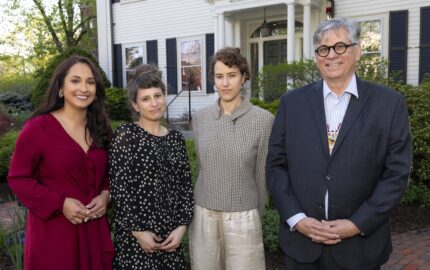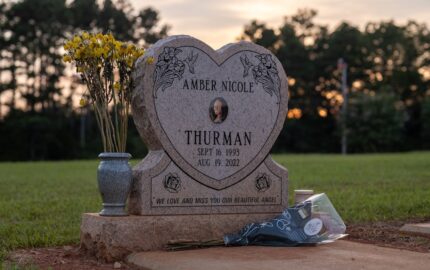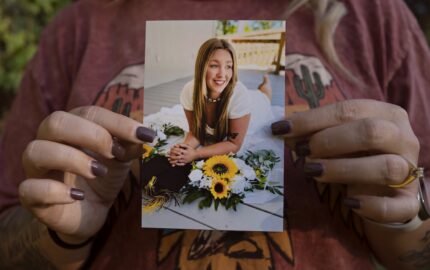CAMBRIDGE, Mass. – The Nieman Foundation for Journalism at Harvard will present the Louis M. Lyons Award for Conscience and Integrity in Journalism to slain Sri Lankan newspaper editor Lasantha Wickrematunge and the journalists of Afghanistan on Tuesday, November 17, 2009.
Nieman Fellows in the Class of 2010 chose the two recipients in recognition of the terrible risks many journalists around the world face in pursuit of their calling. In making their decision, the fellows cited Wickrematunge for daring to stand up, at the cost of his life, for freedom of the press and human rights. The journalists of Afghanistan are being recognized for their bravery in delivering the news from one of the most dangerous reporting environments in the world.
In a prepared statement, the Nieman Fellows wrote: “Lasantha Wickrematunge embodied the principles of a free press in Sri Lanka. His newspapers exposed government corruption and excess. His articles and editorials laid bare the brutality of the 30-year civil war between the Sri Lankan government and the separatist Tamil Tigers in the north of the island. Lasantha and his presses had been attacked so many times that he drafted an editorial predicting his own murder. That editorial was discovered and published three days after he was bludgeoned to death in his car as he drove to work on January 8 of this year. In the piece, he wrote: ‘There is a calling yet above high office, fame, lucre and security. It is the call to conscience.’”
Wickrematunge was a journalist for more than 28 years. In 1994, he founded The Sunday Leader and remained its editor in chief until his death. Before that, he studied law and practiced as a defense attorney for eight years. He also served as private secretary to the leader of the opposition in the Sri Lankan parliament, Sirimavo Bandaranaike, who was the world’s first woman prime minister. Yet it was journalism that remained Wickrematunge’s true calling. In 2000, he received the first Transparency International Integrity Award, created to recognize the courage and determination of the many individuals and organizations fighting corruption around the world.
Wickrematunge’s widow Sonali Samarasinghe, an award-winning editor herself, was compelled to flee Sri Lanka due to threats to her life. A member of the Nieman Class of 2010, she will accept the Lyons Award on behalf of her late husband from Nieman classmate and anchor of Public Radio International’s “The World,” Lisa Mullins. Samarasinghe plans to use the $1,000 prize as seed money for a fund in Wickrematunge’s name to promote human rights and press freedom. She states “Lasantha’s death broke the backbone of free media in the country. Never in our history has there been such a culture of impunity and lack of political will. Eleven months after his murder, no credible inquiry has been made to apprehend his assassins. Lasantha died a martyr for press freedom. His life and work have become an inspiration to the rest of us. He genuinely believed in his motto ‘unbowed and unafraid.’”
Like Wickrematunge, the journalists of Afghanistan work in a perilous environment fraught with daily hazards. Many of these reporters work with the foreign media at great personal risk, providing vital support, services and guidance. The Committee to Protect Journalists has documented the death of six Afghan media workers inside Afghanistan during the last three years.
The Nieman Class of 2010 praised the journalists’ dedication stating: “Their work is crucial to our understanding of events in Afghanistan, but their importance is rarely recognized. They believe that their lives are not as valued as those of their Western colleagues. This was felt most recently after the death in September of Afghan journalist Sultan Munadi from The New York Times. Munadi was killed in a raid which rescued his British colleague Stephen Farrell. The Lyons Award has never before gone to an Afghan journalist. Today, we correct this record and state our admiration for the conscience and integrity of our colleagues in Afghanistan.”
2010 Nieman Fellow and BBC correspondent James Reynolds will present the Lyons Award to New York Times journalist Abdul Waheed Wafa, a close friend of Sultan Munadi, who will accept the honor on behalf of all Afghan journalists. The $1,000 award will go to the Frontline Fixers Fund, which will provide direct financial support to the families of two Afghan journalists killed on the job.
Nieman Foundation Curator Bob Giles praised this year’s Lyons Award winners saying “It’s crucial that we recognize that many journalists worldwide continue to risk their lives to convey important information and uncover truths. They do so at a terrible price and we owe them a debt of gratitude for the extraordinary service they provide.”
Alex S. Jones will deliver the evening’s keynote address and discuss his new book, “Losing the News: The Future of the News That Feeds Democracy.” Jones, a 1982 Nieman Fellow and member of the Nieman Advisory Board, is the Laurence M. Lombard Lecturer in the Press and Public Policy at Harvard Kennedy School and director of the Joan Shorenstein Center on the Press, Politics and Public Policy. He covered the press for The New York Times from 1983-92 and was awarded the Pulitzer Prize in 1987.
The Nieman Class of 1964 established the Louis M. Lyons Award in honor of the Nieman Foundation curator who retired that year after leading the institution for a quarter of a century. The award honors displays of conscience and integrity by individuals, groups or institutions in communications.
In addition to the winners, finalists for this year’s Lyons Award included:
Established in 1938, the Nieman Foundation for Journalism at Harvard administers the oldest midcareer fellowship program for journalists in the world. The fellowships are awarded to working journalists of accomplishment and promise who travel to Harvard University for a year of study, seminars and special events. More than 1,300 journalists from 89 countries have received Nieman Fellowships. The Nieman Foundation also publishes the quarterly magazine Nieman Reports, the nation’s oldest magazine devoted to a critical examination of the practice of journalism, and is home to the Nieman Journalism Lab, which identifies emerging business models and best practices in journalism in the digital media age. Additionally, the foundation runs the Nieman Narrative Digest, a compendium of exceptional narrative journalism, and the Nieman Watchdog, a Web-based project that encourages journalists to monitor and hold accountable all those who exert power in public life.
Nieman Fellows in the Class of 2010 chose the two recipients in recognition of the terrible risks many journalists around the world face in pursuit of their calling. In making their decision, the fellows cited Wickrematunge for daring to stand up, at the cost of his life, for freedom of the press and human rights. The journalists of Afghanistan are being recognized for their bravery in delivering the news from one of the most dangerous reporting environments in the world.
In a prepared statement, the Nieman Fellows wrote: “Lasantha Wickrematunge embodied the principles of a free press in Sri Lanka. His newspapers exposed government corruption and excess. His articles and editorials laid bare the brutality of the 30-year civil war between the Sri Lankan government and the separatist Tamil Tigers in the north of the island. Lasantha and his presses had been attacked so many times that he drafted an editorial predicting his own murder. That editorial was discovered and published three days after he was bludgeoned to death in his car as he drove to work on January 8 of this year. In the piece, he wrote: ‘There is a calling yet above high office, fame, lucre and security. It is the call to conscience.’”
Wickrematunge was a journalist for more than 28 years. In 1994, he founded The Sunday Leader and remained its editor in chief until his death. Before that, he studied law and practiced as a defense attorney for eight years. He also served as private secretary to the leader of the opposition in the Sri Lankan parliament, Sirimavo Bandaranaike, who was the world’s first woman prime minister. Yet it was journalism that remained Wickrematunge’s true calling. In 2000, he received the first Transparency International Integrity Award, created to recognize the courage and determination of the many individuals and organizations fighting corruption around the world.
Wickrematunge’s widow Sonali Samarasinghe, an award-winning editor herself, was compelled to flee Sri Lanka due to threats to her life. A member of the Nieman Class of 2010, she will accept the Lyons Award on behalf of her late husband from Nieman classmate and anchor of Public Radio International’s “The World,” Lisa Mullins. Samarasinghe plans to use the $1,000 prize as seed money for a fund in Wickrematunge’s name to promote human rights and press freedom. She states “Lasantha’s death broke the backbone of free media in the country. Never in our history has there been such a culture of impunity and lack of political will. Eleven months after his murder, no credible inquiry has been made to apprehend his assassins. Lasantha died a martyr for press freedom. His life and work have become an inspiration to the rest of us. He genuinely believed in his motto ‘unbowed and unafraid.’”
Like Wickrematunge, the journalists of Afghanistan work in a perilous environment fraught with daily hazards. Many of these reporters work with the foreign media at great personal risk, providing vital support, services and guidance. The Committee to Protect Journalists has documented the death of six Afghan media workers inside Afghanistan during the last three years.
The Nieman Class of 2010 praised the journalists’ dedication stating: “Their work is crucial to our understanding of events in Afghanistan, but their importance is rarely recognized. They believe that their lives are not as valued as those of their Western colleagues. This was felt most recently after the death in September of Afghan journalist Sultan Munadi from The New York Times. Munadi was killed in a raid which rescued his British colleague Stephen Farrell. The Lyons Award has never before gone to an Afghan journalist. Today, we correct this record and state our admiration for the conscience and integrity of our colleagues in Afghanistan.”
2010 Nieman Fellow and BBC correspondent James Reynolds will present the Lyons Award to New York Times journalist Abdul Waheed Wafa, a close friend of Sultan Munadi, who will accept the honor on behalf of all Afghan journalists. The $1,000 award will go to the Frontline Fixers Fund, which will provide direct financial support to the families of two Afghan journalists killed on the job.
Nieman Foundation Curator Bob Giles praised this year’s Lyons Award winners saying “It’s crucial that we recognize that many journalists worldwide continue to risk their lives to convey important information and uncover truths. They do so at a terrible price and we owe them a debt of gratitude for the extraordinary service they provide.”
Alex S. Jones will deliver the evening’s keynote address and discuss his new book, “Losing the News: The Future of the News That Feeds Democracy.” Jones, a 1982 Nieman Fellow and member of the Nieman Advisory Board, is the Laurence M. Lombard Lecturer in the Press and Public Policy at Harvard Kennedy School and director of the Joan Shorenstein Center on the Press, Politics and Public Policy. He covered the press for The New York Times from 1983-92 and was awarded the Pulitzer Prize in 1987.
The Nieman Class of 1964 established the Louis M. Lyons Award in honor of the Nieman Foundation curator who retired that year after leading the institution for a quarter of a century. The award honors displays of conscience and integrity by individuals, groups or institutions in communications.
In addition to the winners, finalists for this year’s Lyons Award included:
- Emilio Morenatti: An Associated Press photojournalist who lost his left foot in a roadside bombing in Afghanistan in August, Morenatti was named Newspaper Photographer of the Year in 2009 by Pictures of the Year International.
- Maziar Bahari: A Canadian-Iranian documentary filmmaker, playwright, editor, journalist and writer, Bahari was held prisoner in Iran from June 21 – Oct. 20 this year, following Iran’s disputed presidential elections.
- Aye Aye Win: An Associated Press correspondent in Myanmar (Burma) since the 1980s, Win was the first female reporter in her country and routinely jeopardizes her own safety to report the news from one of the most difficult reporting environments in the world.
- Pedro Rosa Mendes: A journalist, writer and novelist from Portugal, Mendes has reported extensively from Africa, Europe and East Timor.
Established in 1938, the Nieman Foundation for Journalism at Harvard administers the oldest midcareer fellowship program for journalists in the world. The fellowships are awarded to working journalists of accomplishment and promise who travel to Harvard University for a year of study, seminars and special events. More than 1,300 journalists from 89 countries have received Nieman Fellowships. The Nieman Foundation also publishes the quarterly magazine Nieman Reports, the nation’s oldest magazine devoted to a critical examination of the practice of journalism, and is home to the Nieman Journalism Lab, which identifies emerging business models and best practices in journalism in the digital media age. Additionally, the foundation runs the Nieman Narrative Digest, a compendium of exceptional narrative journalism, and the Nieman Watchdog, a Web-based project that encourages journalists to monitor and hold accountable all those who exert power in public life.


